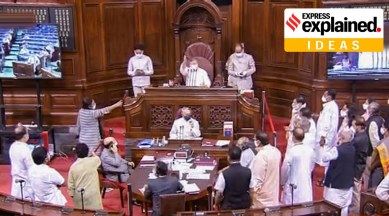Explained Ideas: Why the govt should not have railroaded the farm bills
Pratap Bhanu Mehta writes: Betrayal of procedure in Parliament is not just about technicalities; deference to process builds trust.

On Sunday, the bills pertaining to agriculture were debated. But after the debate, the deputy chairperson of Rajya Sabha refused a division. Pratap Bhanu Mehta, contributing editor of The Indian Express, calls this a “travesty” of Parliament.
“It is railroading a bill through, not on its deliberated merits, but on the sheer dint of power”.
The government has a majority. “What would it have lost if it had paid some due deference to form, by allowing more deliberation in a committee?” he asks. “By allowing a division we would at least record where each member of Parliament stood on a question of monumental importance. It is unlikely that the bill would have been stopped,” he states.
Mehta points out that a lot of the success of these bills depends on trust and consensus. The bills pertaining to the APMC can be defended. A lot of the farmers’ legitimate fears have less to do with the text and more with the context: The fear that, in a fiscal crunch, MSP will be rolled back or procurement curtailed.
📣 Express Explained is now on Telegram. Click here to join our channel (@ieexplained) and stay updated with the latest
There is genuine uncertainty over what private procurement will mean. Will it mean greater corporate power over farmers, possibly unhealthy monopolies or duopolies? Will they be harder to negotiate with than a state monopoly?
“These questions require less of a resolution in a bill, but trust in a government’s overall trajectory,” he states.
Previous governments have also ridden roughshod over federalism. But the simple point is that referring it to a committee could have at least allowed the exploration of other possibilities. It is also possible that in the case of the APMC, a more creative solution could have been found for concerns of the states, like an opt-out clause for them.
Also read | Explained ideas: Why a sharp economic recovery in 2021 can be misleading
Given that the government has the numbers, its parliamentary strategy is not simply to win. “It is to show that it can pretty much do anything with impunity,” he states.
Predictably, unruly behaviour by the Opposition followed.
“But when impunity is procedure, insolence will follow,” states Mehta.